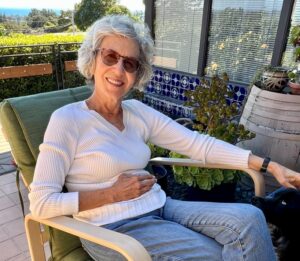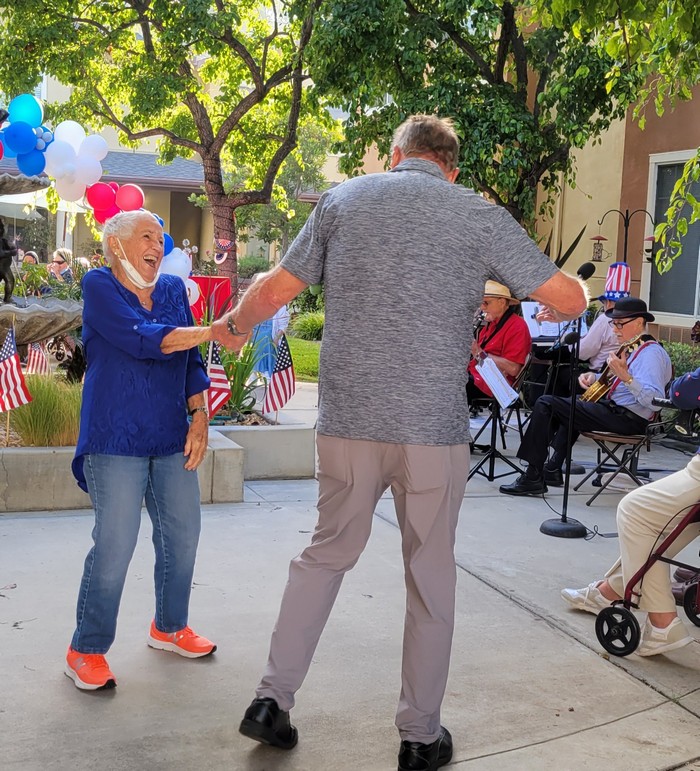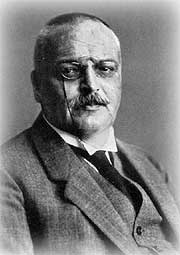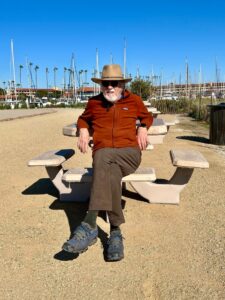
by Patricia Schallert
There are many seniors among us who have lived and continue to live lives that can be considered “success stories”…. Let’s meet Kathleen Wheeler and see how she sees it.
Kathleen is a 72 young retired woman, born in Baltimore, Maryland, who lived in Antigua as a youngster and then moved to Ventura where she graduated from Ventura High School in 1968. She lived in San Diego for a number of years before retiring seven years ago and moved back to Ventura where she now considers herself a “local”.
As Kathleen reflected on her retirement, she knew when it was time to retire. She enjoyed her career working in “Organization Development” as a psychologist very much and thought she would stay in her career until, she said “she dropped”. Her work was intense, with demanding bosses, paperwork and deadlines.
Upon retirement Kathleen and her husband moved to Ventura in December, 2017, the day before the Thomas Fire started. Still living out of boxes, they evacuated to a family friend’s house where they waited out the fire and prayed their house would still be standing when the evacuation orders were lifted.
She no longer had deadlines, paperwork and those challenging bosses. But Kathleen discovered through her friend’s connections that there was a passion growing inside her that she had not thought of as she waited out the fire. Her family friend was a scientist who asked her to help him write an essay on “Climate Change and Culture”.
“With the freedom that retirement provides, finding purpose and meaning and the right balance of activity vs leisure, is not always a slam dunk”, she said. She began to facilitate workshop sessions and supported others though her church to get in touch with new ways of looking at retirement. With her community members from her church, she explored the ideas of volunteering, a possible second career or a more leisurely life.
Learning to just “Be”, was difficult at first. The absence of structure, the absences of dead lines or commitments to others was challenging, and to no longer be defined by the career itself, helped her focus on how to create her own structure in her life.
But with retirement came an unlimited amount of possibilities which at times was overwhelming. “You can do many things when you retire, just not everything” was one of many lessons she learned.
Unexpected events were the hardest to accept for Kathleen. There were also difficulties with the loss that comes with working, since most people are defined by their work or career until they retire. Structure, alarm clocks and deadlines were no longer a part of her life, but independence moved to the front of the line and with that came writing classes, workshops and community involvement. A particular class about climate change became a turning point in Kathleen’s life and she has become a relentless activist on the importance of climate action, most recently by pushing for an “Electrification Ordnance” in Ventura.
Reducing green house gasses by starting the Ventura Climate Coalition keeps her busy most days, sometimes “too busy.” The Ventura Climate Coalition is just one voice, but there are a growing number and the hope is that eventually, they will be heard.
But the joy is in the involvement and the support she has gained from the community and tiny baby steps in the process. Kathleen accepts failure as a part of the growth and learning and has learned to value acceptance and compassion in the process of having those difficult conversations with those who have a different point of view. For Kathleen, “Retirement is about meaning, legacy, reconciliation, forgiveness and spirituality”.
Editor: If you are a senior, or know of one, who would like to share their retirement, or job, with us let us know at [email protected].





